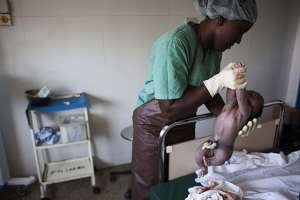
Accra, July 25, GNA - A study published in Volume Two, Issue Eight of The Lancet Global Health journal shows that Plasmodium falciparum malaria infection during pregnancy in Africa leads to adverse outcomes including low birthweight.
However, contemporary estimates of the potential burden of malaria in pregnancy in Africa (in the absence of interventions) are poor, which the study sought to estimate the need to protect pregnant women from malaria across the continent.
The study dubbed: 'Estimated risk of placental infection and low birth weight attributable to Plasmodium falciparum malaria in Africa in 2010: A Modelling Study' was made available to the Ghana News Agency on Friday.
Using a mathematical model applied to estimates of the geographical distribution of P falciparum across Africa in 2010, the study estimated the number of pregnant women who would have been exposed to infection that year in the absence of pregnancy-specific intervention.
It then used estimates of the parity-dependent acquisition of immunity to placental infection and associated risk of low birth weight to estimate the number of women who would have been affected.
The study estimate that, without pregnancy-specific protection, 12·4 million pregnant women (44·9 per cent of all 27·6 million live births in malaria endemic areas in Africa in 2010) would have been exposed to infection, with 11·4 million having placental infection (41·2 per cent of all live births).
It said this infection leads to an estimated 900 000 (95 per cent credible interval 530 000—1 240 000) low birthweight deliveries per year.
Around the end of the first trimester, when the placenta becomes susceptible to infection, is a key period during which the study estimate that 65·2 per cent (95 per cent) of placental infections first occur.
The study calculations are the only contemporary estimates of the geographical distribution of placental infection and associated low birth weight.
According to the study, the risk of placental infection across Africa in unprotected women is high.
It said prevention of malaria before conception or very early in pregnancy is predicted to greatly reduce incidence of low birth weight, especially in primigravidae.
It observed that the underlying lifetime risk of low birth weight changes slowly with decreasing transmission, drawing attention to the need to maintain protection as transmission falls.
The study concluded that, despite documented reductions in malaria transmission in various parts of Africa, the burden of placental infection in unprotected pregnant women remains.
This draws attention to the need to maintain high levels of intervention coverage in pregnant women during the transition to universal coverage.
The study results also suggest that measures that reduce exposure to infection in the early stages of, or immediately before, pregnancy, such as insecticide-treated nets, are likely to be very effective in prevention of placental infection and corresponding low birth weights, especially in women during their first pregnancy.
The study was funded by Malaria in Pregnancy Consortium and the Bill & Melinda Gates Foundation.
GNA EN-GB X-NONE X-NONE




 Former Kotoko Player George Asare elected SRC President at PUG Law Faculty
Former Kotoko Player George Asare elected SRC President at PUG Law Faculty
 2024 elections: Consider ‘dumsor’ when casting your votes; NPP deserves less — P...
2024 elections: Consider ‘dumsor’ when casting your votes; NPP deserves less — P...
 You have no grounds to call Mahama incompetent; you’ve failed — Prof. Marfo blas...
You have no grounds to call Mahama incompetent; you’ve failed — Prof. Marfo blas...
 2024 elections: NPP creates better policies for people like us; we’ll vote for B...
2024 elections: NPP creates better policies for people like us; we’ll vote for B...
 Don’t exchange your life for wealth; a sparkle of fire can be your end — Gender ...
Don’t exchange your life for wealth; a sparkle of fire can be your end — Gender ...
 Ghana’s newly installed Poland train reportedly involved in accident while on a ...
Ghana’s newly installed Poland train reportedly involved in accident while on a ...
 Chieftaincy disputes: Government imposes 4pm to 7am curfew on Sampa township
Chieftaincy disputes: Government imposes 4pm to 7am curfew on Sampa township
 Franklin Cudjoe fumes at unaccountable wasteful executive living large at the ex...
Franklin Cudjoe fumes at unaccountable wasteful executive living large at the ex...
 I'll 'stoop too low' for votes; I'm never moved by your propaganda — Oquaye Jnr ...
I'll 'stoop too low' for votes; I'm never moved by your propaganda — Oquaye Jnr ...
 Kumasi Thermal Plant commissioning: I pray God opens the eyes of leaders who don...
Kumasi Thermal Plant commissioning: I pray God opens the eyes of leaders who don...
